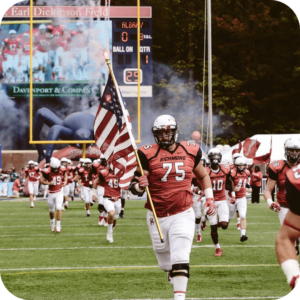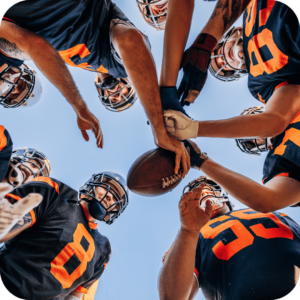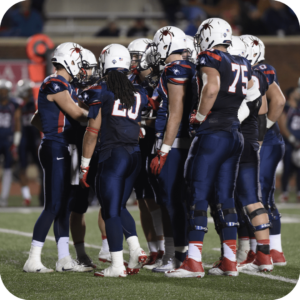People often ask me the same question when they find out that I played college football: “Do you miss it?” On the surface, it’s a bad question with an obvious answer. Yes.
However, if I give myself a minute to sit with that question, the answer is more nuanced. Yes, I miss playing football, but I find myself in a career where I get to engage in many of the same skills and instincts that made football so rewarding.
In this blog, I am going to show how playing offensive line paved the way for a successful consulting career and which skills I look for when assessing potential consultants.
High Impact Problem Solving
“Didn’t get promoted? Good. More time to get better. Got injured? Good. Learned something. Unexpected problems came up? Good. We get to figure out the solution.” – Jocko Willink
The thing I miss most about playing offensive line is what I refer to as “high impact problem solving.” Physical chess. Five to eight players working together to identify the threat that a defense poses and work together to neutralize it. If any one of them fail, the quarterback gets hit. You get used to making quick decisions under duress with extreme consequences.
Just like consulting engagements, every play begins with a desired outcome, a plan to achieve it, assumptions of what the expected circumstances are, and mitigations in place for alternatives. In consulting, that might be a detailed project plan. In football, it looks like Trips Right Empty 57 Dagger. That tells everyone where to go and what to do. It is a 5-man protection, so we can block 5 defenders.
Well, they brought 6. What now?
 You adjust. If the extra blitzer is on my side, I slide the protection to the right and now the quarterback knows he is hot off the left. By being able to quickly problem solve as a unit, we turn that risk (blitz) into an opportunity (uncovered slot receiver) and take advantage.
You adjust. If the extra blitzer is on my side, I slide the protection to the right and now the quarterback knows he is hot off the left. By being able to quickly problem solve as a unit, we turn that risk (blitz) into an opportunity (uncovered slot receiver) and take advantage.
On my last engagement, we were implementing Microsoft Fabric as it was still being built by Microsoft. Their plan changed constantly during our project and we had to adapt. Blocked on Data Source A? Good. We got a head start on Data Source B. Clients don’t pay us to tell them about problems. They pay us for solutions.
Anonymous Excellence
“The Team, the Team, the Team.” – Coach Bo Schembechler
It is not about you. That’s a lesson learned very early in an offensive lineman’s career. Your name will only be called when you give up a sack or get a penalty. You have no officially recorded stats. You will never get the ball. An individual performing well on the offensive line does nothing for the team if the rest of the group is not in sync.
Similarly, consulting project teams need to work as a cohesive unit. If the design team creates the most stunning Figma prototype the world has ever seen, but the frontend team doesn’t build it properly, then the project fails. Shared ownership of outcomes is critical to team success.
I’ve heard our CTO, Josh Bartels, say on numerous occasions that he has “no ego in ownership,” meaning that if he comes up with a great idea that someone else implements, he doesn’t need the credit. That mentality is critical for consulting and company success. A rising tide lifts all boats.
Rewiring Your Instincts
“It ain’t what you don’t know that gets you into trouble. It’s what you know for sure that just ain’t so” – Mark Twain
 Jim Harbaugh, the coach of the Los Angeles Chargers, recently broke from convention by referring to offensive lineman as “skill” players. That title is usually reserved for the more athletic positions like cornerback or wide receiver. His argument was that those other positions are relying heavily on God-given ability. The offensive lineman must learn a skill that is not natural to him.
Jim Harbaugh, the coach of the Los Angeles Chargers, recently broke from convention by referring to offensive lineman as “skill” players. That title is usually reserved for the more athletic positions like cornerback or wide receiver. His argument was that those other positions are relying heavily on God-given ability. The offensive lineman must learn a skill that is not natural to him.
You learned to run by leaning forward and pushing off your toes. Now you need to sit back on your whole foot and be balanced. You may have learned to tackle someone by “wrapping up.” Now you need to keep your hands inside and use leverage. Every instinct you have is wrong for playing offensive line.
Consulting requires the same willingness to unlearn and relearn. Your first instinct when a client pushes back on your recommendation is to defend it and explain why you’re right. Wrong. The correct response is to listen, understand their concern, and find a path forward that addresses both the technical requirement and their business reality.
I spent years training my body to do unnatural things on the football field. Now I spend my days training my mind to approach problems in ways that don’t come naturally.
Earning Trust
“Trust is earned in drops and lost in buckets.” – Kevin Plank
There are two types of trust on an offensive line: forced trust and earned trust. Forced trust happens on day one when you walk into the huddle. Five guys who barely know each other must immediately trust that everyone will do their job, because if they don’t, someone’s getting hurt. There’s no time for team-building exercises or trust falls.
Earned trust develops over time through thousands of repetitions, late-night film sessions, and proving yourself when it matters. It’s also built something called “trauma bonding” – going through difficult experiences together that create unbreakable bonds.
Consulting teams operate the same way. On day one of a project, you have forced trust. But earned trust comes from staying late to fix a critical bug before the demo, from being honest when the timeline is unrealistic, from having difficult conversations with stakeholders when necessary.
The best project teams I’ve been on had that same trauma bonding experience. We went through impossible deadlines, technical challenges that seemed insurmountable, and difficult client situations together. Those shared experiences create the kind of trust that makes future projects easier.
Film Doesn’t Lie
“I watch film like I watch food being prepared. I need to see every detail.” – Kobe Bryant
One of the most humbling aspects of playing football is that every mistake is recorded and reviewed. Film doesn’t lie. You can’t convince yourself you played well when the video clearly shows you getting beaten on third and long.
Nothing humbles you quite like a coach reviewing film of your failure in front of your closest friends over and over again telling you what you did wrong. Somehow constructive feedback from your manager just doesn’t quite hit the same after that.
 Consulting has the same public accountability. Your code gets reviewed. Your presentations get questioned. Your recommendations either work or they don’t. The clients who pay your bills can tell immediately whether you’re adding value.
Consulting has the same public accountability. Your code gets reviewed. Your presentations get questioned. Your recommendations either work or they don’t. The clients who pay your bills can tell immediately whether you’re adding value.
This constant scrutiny develops self-awareness quickly. You learn to be honest about your performance because external feedback will correct any delusions anyway. You get comfortable with criticism because you know it’s the fastest path to improvement. Most importantly, you develop the ability to separate your ego from your performance. Feedback isn’t failure, it’s education.
Becoming Multilingual
“You have to be able to communicate with 11 different guys who all think differently, all have different backgrounds. The beauty is getting everyone to speak the same language.” – Peyton Manning
In five years of college football, I played for four different offensive coordinators. Each one brought their own system, their own terminology, their own way of calling plays. What one coordinator called “Sword” another called “28.” The same blocking scheme had completely different names depending on who was running the offense. Every spring, I had to learn an entirely new language.
The first few practices with a new coordinator were always brutal. You’d think you understood the call, then realize you were thinking in last year’s terminology and just left your quarterback exposed. But by the end of spring ball, you were fluent again. You had to be.
Consulting is exactly the same. Every client has their own language. What one company calls “ETLs” another calls “data feeds.” Some companies live and die by OKRs, others swear by KPIs, and some have invented their own acronym soup that makes no sense to outsiders.
The key isn’t just learning the vocabulary – it’s understanding what matters behind the words. When a coordinator changed from “29” to “Lance”, the blocking scheme was much the same, but his priorities were different. One cared more about opening up the cutback lane than sealing the edge. Similarly, when a client talks about “digital transformation” vs “technology modernization,” they’re often talking about the same technical changes, but their focus is different – one is thinking about business outcomes, the other about IT capabilities.
The best consultants become fluent in new business languages quickly. Not just the acronyms and buzzwords, but the underlying priorities and concerns those words represent. It’s the difference between translating words and understanding meaning.
Character Over Credentials
“Hire character. Train skill.” – Peter Schutz
 When I’m evaluating potential consultants, I’m not looking for former athletes specifically. I’m looking for evidence of these transferable skills, regardless of where they were developed. Can they handle high-pressure situations? Do they put team success above individual recognition? Are they willing to learn skills that don’t come naturally?
When I’m evaluating potential consultants, I’m not looking for former athletes specifically. I’m looking for evidence of these transferable skills, regardless of where they were developed. Can they handle high-pressure situations? Do they put team success above individual recognition? Are they willing to learn skills that don’t come naturally?
Some people develop these skills through sports. Others develop them through theater, music, military service, or previous work experience. The source doesn’t matter. What matters is that they’ve been tested under pressure and proven they can perform when it matters.
Football taught me that talent gets you in the door, but character determines how far you’ll go. The same principle applies to consulting.
So yes, I miss playing football. But I’ve found a career that requires many of the same skills I loved about the game. And when I find team members who understand that work is a team sport played at the highest level, with real consequences for failure and real rewards for success, I know we’re going to do something special together.

 You adjust. If the extra blitzer is on my side, I slide the protection to the right and now the quarterback knows he is hot off the left. By being able to quickly problem solve as a unit, we turn that risk (blitz) into an opportunity (uncovered slot receiver) and take advantage.
You adjust. If the extra blitzer is on my side, I slide the protection to the right and now the quarterback knows he is hot off the left. By being able to quickly problem solve as a unit, we turn that risk (blitz) into an opportunity (uncovered slot receiver) and take advantage. Jim Harbaugh, the coach of the Los Angeles Chargers, recently broke from convention by referring to offensive lineman as “skill” players. That title is usually reserved for the more athletic positions like cornerback or wide receiver. His argument was that those other positions are relying heavily on God-given ability. The offensive lineman must learn a skill that is not natural to him.
Jim Harbaugh, the coach of the Los Angeles Chargers, recently broke from convention by referring to offensive lineman as “skill” players. That title is usually reserved for the more athletic positions like cornerback or wide receiver. His argument was that those other positions are relying heavily on God-given ability. The offensive lineman must learn a skill that is not natural to him. Consulting has the same public accountability. Your code gets reviewed. Your presentations get questioned. Your recommendations either work or they don’t. The clients who pay your bills can tell immediately whether you’re adding value.
Consulting has the same public accountability. Your code gets reviewed. Your presentations get questioned. Your recommendations either work or they don’t. The clients who pay your bills can tell immediately whether you’re adding value. When I’m evaluating potential
When I’m evaluating potential 